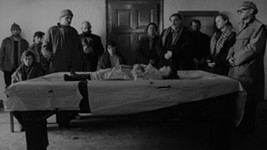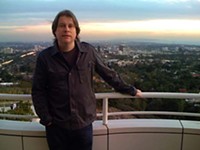Riding the 'Wave'
Bud Shrake compacts a far-flung, storied career in his new collection
By Spencer Parsons, Fri., April 25, 2008

"There are people who go to New York as professional Texans," Edwin "Bud" Shrake says. "But I'm just an accidental Texan. By which I mean I didn't want it, but I wasn't ever trying to get away from it." Nevertheless, he's one of the most important writers that Texas has produced, according to Steven L. Davis, assistant curator for the Southwestern Writers Collection, author of Texas Literary Outlaws, and editor of new Bud Shrake collection Land of the Permanent Wave. "He's always had an instinct to be in the thick of the action," says Davis. "As a sportswriter he became friends with the men in Dallas who owned the football teams ... and that gave him access to the world of the oil tycoons, you know, with the gold-plated toilets and all that, as well as the very reactionary political currents ... which on its own would be great for a novelist. But you know, at the same time, he was a regular patron at Jack Ruby's nightclub and dating the star stripper, and his friends were sort of the beatniks of Dallas."
Shrake has experienced a lot more of Texas in his 50-year career than most writers could imagine, and his writing has been equally varied, from pounding out police blotters to bringing New Journalism to the pages of Sports Illustrated, from long-form magazine essays to novels (Strange Peaches, Custer's Brother's Horse) to feature films, not to mention co-authoring Willie Nelson's autobiography and the golfers' bible, Harvey Penick's Little Red Book. Land of the Permanent Wave brings all these streams together while folding in personal letters and fascinating excerpts from unproduced screenplays. The book reads more like an accidental autobiography than an introduction for the uninitiated, and one suspects that even if he didn't want that, he wasn't exactly trying to get away from it, either.
Austin Chronicle: Sportswriting has been a constant throughout your career. Has sports been a useful lens for you to look at other subjects, or is it something else?
Bud Shrake: Sports to me was always a good gig. I was a police reporter for a long time. Covered all kinds of things. But I'd look over at the sports department, and they were all laughing, and half of 'em were drunk. They were all having a good time, and also, they traveled. I'd look over at those guys and think: "Well, they've got the deal. If I'm gonna work for a newspaper" – which is something that I really love to do – "but if I'm not gonna be a foreign correspondent in Paris working for the Herald-Tribune, then I wanna be a sportswriter." You know, because you get to go to New York and L.A. and wherever, and all you gotta do is watch football or something and write about it. That's fun.
I thought of myself as a novelist who did sportswriting. But I never thought of myself as being a screenwriter. I just did it. You know, the first one, my wife and I went to see Butch Cassidy and the Sundance Kid, and we were in a bar later talking about it, and you know, it was a huge, popular movie. And I said, "Well, yeah, I liked it; I liked it a lot," but I said, "If that's so popular, I think I can write a script that good." And she said, "No, you can't." And I said, "Well, I'll show you." And I went back home, and within two to three weeks, I wrote that script [Kid Blue]. I didn't know what I was doing. And I sent it to my agent in New York, and she called me up and said, "This is the worst script I ever read." And I said, "I want a second opinion," and she said, "Yeah, okay, I'll send it to a friend of mine, an agent in Los Angeles, and she won't be as kind to you as I am." So it went to this agent in L.A., and she gave it to this producer, Marvin Schwartz, and he took it in to Daryl Zanuck at 20th Century Fox, who sat there, read the script, picked up the telephone, and put it into production. And I thought, "This is the easiest thing I've done in my life!" I didn't realize then what a long shot that was, how lucky I was. You know, all those ponds of alligators you gotta jump over. And then, you know, I quit Sports Illustrated.
AC: Why?
BS: Well, my hero there, my rabbi, André Laguerre, he was the managing editor, and he'd been Charles DeGaulle's press secretary, been in the French underground. Remarkable, remarkable man. Every new play in New York, he'd seen it, [would] talk to you about it in a bar. Any new novel of any importance, he'd read it. Smoked maybe about 12 big Cuban cigars and drank a quart of scotch every day and somehow managed to run a magazine, turned Sports Illustrated from a money-loser into a profit-maker. We looked at ourselves as The New Yorker of sportswriting. And so André, the first 10 years I was there, he let me have time off to write novels and movies and stuff. And sent me on glamorous assignments all over the world. ... André had run the magazine for writers and photographers at the top. But they had a change in power at Time Inc. They put marketing at the top, and writers and photographers dropped down a few notches, and they got rid of André. And when they got rid of André, the handwriting was on the wall for guys like me. And about that time, Columbia hired me to adapt a bestselling novel called Nightwing. It was supposed to be Columbia's answer to Jaws. So I quit. Which was kind of funny, because it turned out not to be Columbia's answer to Jaws. To me, it was about oil interests tearing up the Hopi and Navajo reservations. But to Columbia, it was only about vampire bats, and it was just a big mess. One time, we were having a meeting in the executive dining room at Columbia, and they had hired this guy, Carlo Rambaldi, who built King Kong, to make the vampire bats. And he brought in a big one that he was really proud of. It would flap around the room and shit. But they got real mad at him; the head of Columbia yelled at him, "Goddammit, Carlo, you made our bats too big!" And I thought what a great title that would be: You Made Our Bats Too Big ...
AC: There are a lot of connections between the different things you write – how one of your subjects in a Sports Illustrated piece becomes a character in one of your novels.
BS: You know, with writing fiction, [it's] a hard thing to talk about, because, you know, philosophers and scientists have never agreed on what human consciousness is. Or whether it even exists. But human consciousness is where fiction writers have their office. It's where you go to work. It's required somewhat for all fiction – but some fiction is more heavily based on autobiography. Strange Peaches, when a friend of mine read it, he said: "I've read 300 pages. Where does the fiction start?" ... There are novels that are just purely imaginative, and those are the ones where human consciousness is totally in charge. All fiction writers you talk to – well, all of the good ones at least – say they hear voices. Like Kipling said: You wait, you listen, and you obey. ...
And so fiction writers hear these voices, but then the question becomes: Where do these voices come from? Are they just crazy, or what? And you'd be surprised at the answers from various writers where these voices come from. David Milch [creator of Deadwood] told me that his voices come from the body of Christ, and he didn't explain it to me, and I don't know what that's supposed to mean, but what it means to me is that he doesn't know either. Actually the best explanation I ever heard comes from a guy named Bundini Brown. ... It was his job to help Muhammad Ali work himself into this psychic frenzy to take on this guy that everyone was afraid of, Sonny Liston. He came up with: "Float like a butterfly, sting like a bee. The hands can't get what the eyes can't see." At any rate, his explanation to me was that the brain is like a radio: It both sends and receives ... and some people's radios pick up different waves of knowledge in the ether, waves for arithmetic or for artistic creativity or for music and like that. You just have to be tuned into these different waves, and he said to me, "You're tuned into these storytelling waves." He would say that you can always see about 15 percent of the universe, but 85 percent of it is dark matter and dark energy. And in that 85 percent is all the knowledge of all the stories that ever happened. The molecules are made up of the stories captured in the ether. And if you're tuned in right, they'll come into your receiver, and for me, that's as good an explanation as anybody has ever come up with.
The Southwestern Writers Collection at Texas State University will host an evening devoted to Bud Shrake and his new collection, Land of the Permanent Wave: An Edwin "Bud" Shrake Reader, on Saturday, April 26, at the Wittliff Collections in the Alkek Library on the Texas State campus. A 6pm Champagne and chocolate reception will be followed by a 7pm reading by G.W. Bailey from the new book, with a booksigning afterward. Admission is free, but attendees are encouraged to RSVP. For more information, see www.thewittliffcollections.txstate.edu.










